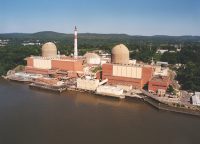Nuclear Tragedy Anniversary Raises Concerns about Indian Point
By Anna Young
A group of environmentalists gathered in Peekskill Sunday afternoon commemorating the seventh anniversary of the nuclear tragedy in Fukushima, Japan and cautioning if Indian Point could be next.
Throughout the five-hour ceremony, members of the Indian Point Safe Energy Coalition (IPSEC) sang songs, gathered in prayer and raised awareness to the possible effects radiation exposure could have on the more than 20 million people who live within the plant’s 50-mile radius in the event of an explosion.
On March 11, 2011, a devastating tsunami and earthquake in Fukushima disabled the power supply and cooling of three reactors causing a nuclear accident that released radioactive materials into the environment.
“When people think about the chance of a nuclear accident it seems very abstract, but when those things happen it’s devastating,” said Peekskill resident and cancer researcher Courtney Williams. “We have a community here that has seen the worst, and this is our warning call to make sure that we seize this opportunity to address the decommissioning process and make our communities as safe as possible.”
Despite the projected 2021 closing of Indian Point, activists stressed that more than 2,700 tons of irradiated fuel rods stored indefinitely on-site is higher than the radioactive waste the was in all the fuel pools at Fukushima when the three nuclear reactors failed.
Williams added that closing Indian Point doesn’t eliminate any risk because of the high-pressure transmission gas pipelines underneath the 40-years’ worth of irradiated spent fuel at the Buchanan property. She stressed the importance of understanding the potential risks the pipeline poses adding how Gov. Andrew Cuomo needs to release the risk assessment he ordered on the Enbridge/Spectra AIM pipeline two years ago.
“Shutting down the plant doesn’t solve our problem, but it does give us an opportunity to make our community as safe as possible,” she said. “But we need the risk assessment so that we can put that stored waste in a safer location so that spent fuel fire doesn’t happen.”
Hiroko Aihara, a Fukushima native, explained that more than 50,000 residents continue to evacuate the area due to radiation contamination. She said that Fukushima still hasn’t recovered from their “severe” accident and people continue to suffer.
She added how many lost their homes and wildlife died off due to the contamination. And while her health remains intact, some of her friends were diagnosed with cancer because of the meltdown. The government isn’t concerned about the radiation, but the local people really want to continue to study their health, she said.
“Radiation we couldn’t see and couldn’t smell. It’s invisible,” she said. “I want to ask the Indian Point people to please consider what happened after our nuclear plant accident. Let’s prepare for the next disaster or ask them to choose renewable energy.”
To ensure public safety, the IPSEC want to establish a Citizens Oversight Board to oversee the Indian Point decommissioning process. If approved and funded by the New York State legislature, the board would include members from IPSEC, Hudson River Sloop Clearwater, Stop the Algonquin Pipeline Expansion (SAPE), and other stakeholders familiar with Indian Point, with access to nuclear experts.

Rick has more than 40 years’ experience covering local news in Westchester and Putnam counties, running the gamut from politics and crime to sports and human interest. He has been an editor at Examiner Media since 2012. Read more from Rick’s editor-author bio here. Read Rick’s work here: https://www.theexaminernews.com/author/pezzullo_rick-writer/

